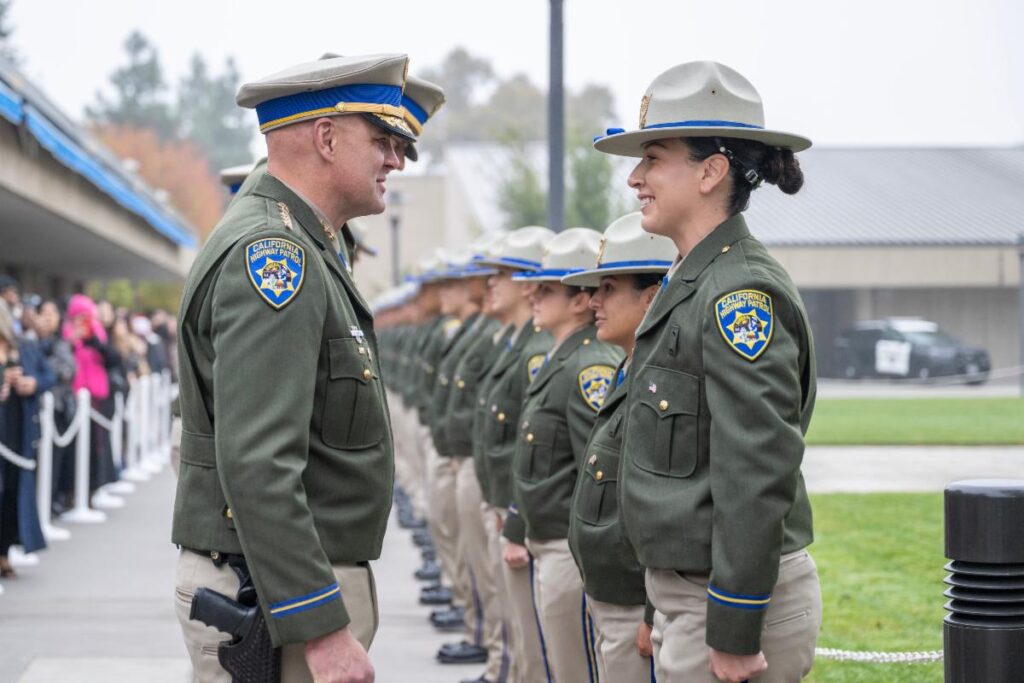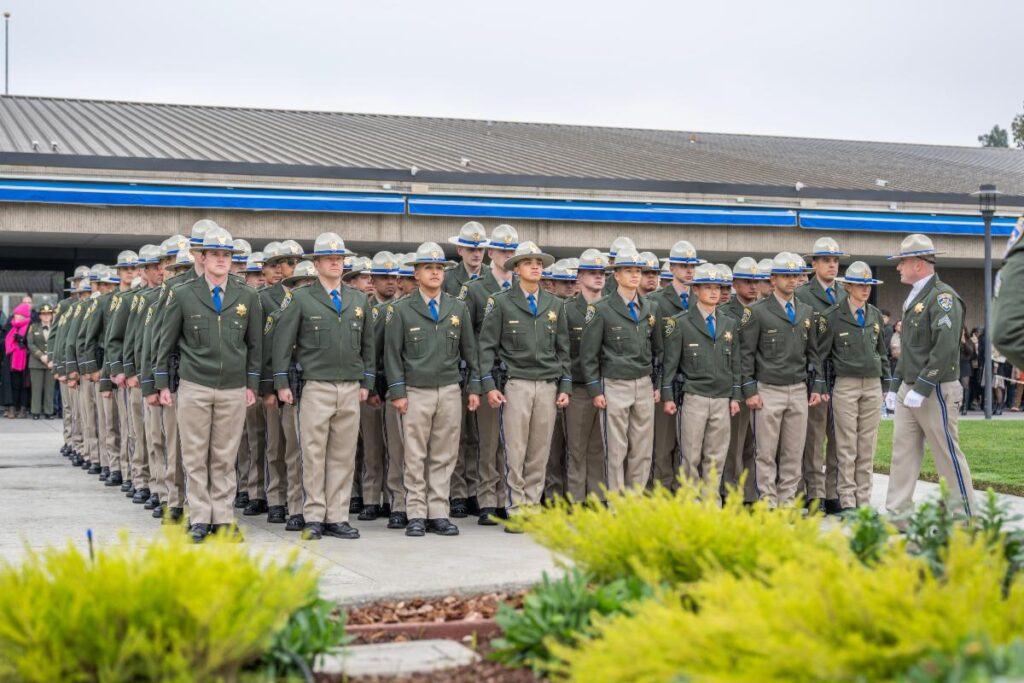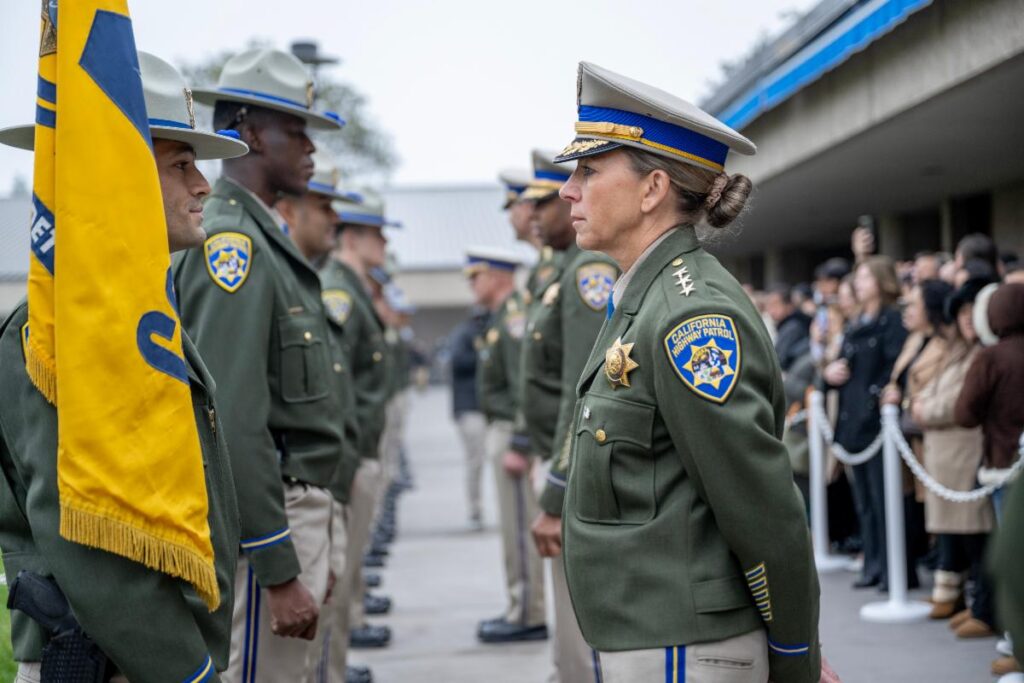Both 36 years old
By Peggy ChouSan, PIO, Pablo Police Department
On Monday, December 29, 2025, at approximately 9:07 p.m., San Pablo Police officers responded to the 1400 block of Rumrill Boulevard regarding reports of a shooting.
Upon arrival, officers located two adult male victims suffering from multiple gunshot wounds. Both victims were transported to a local hospital for medical treatment. Despite life-saving efforts, one victim, a 36-year-old Richmond resident, succumbed to his injuries. The second victim, also a 36-year-old Richmond resident, remains in critical condition. The identities of the victims are being withheld pending further notification.
San Pablo Police Department Detectives responded to the scene and assumed the investigation. This incident is being investigated as a homicide, and the investigation remains active. No additional details are available at this time. The suspect(s) remain outstanding.
Anyone with information related to this incident is encouraged to contact the San Pablo Police Department Investigations Division at (510) 215-3150.
Read MoreConvicted felon
By Lt. Mark Louwerens, Brentwood Police Department
Brentwood, CA – The suspect in the fatal officer involved shooting that occurred on Christmas Eve has been identified as, Romaine Alexander Morgan, 43-year-old male from Stockton, CA.
Further investigation following the shooting revealed Morgan was a convicted felon, had an extensive history of convictions for weapons related charges, including two convictions for armed robbery where Morgan served prison time.
As previously reported, on Wednesday, December 24, 2025, at around 10:55 p.m., Brentwood Officers conducted a traffic enforcement stop on a vehicle in the area of Balfour Road and Foothill Drive for suspicion of DUI. Officers contacted the driver, a male in his 40’s, who was the only occupant in the vehicle.
While speaking to the driver, officers developed probable cause to search the vehicle. During the search, officers located a loaded, high-powered rifle inside the vehicle. When officers attempted to arrest the driver, he physically resisted arrest, refused to follow verbal commands and ultimately grabbed the high-powered rifle.
An officer-involved shooting occurred in which one officer fired their weapon. Several officers rendered emergency medical aid until paramedics arrived on scene. However, the suspect succumbed to gunshot wounds at the scene.
No officers were seriously injured during this incident.
The attached photo depicts the rifle Morgan possessed prior to the shooting. The rifle had no serial number and given Morgan’s felony conviction status, he was a prohibited person from possessing any firearms.
According to localcrimenews.com, the six-foot, one-inch tall, 365-pound Morgan was Black and had been arrested four times including once by Sacramento County Sheriff’s Deputies in 2022 for prisoner possessing a weapon and three times by San Joaquin County Sheriff’s Deputies: in 2024 for battery on a spouse, cohabitant, former spouse and threats of violence; on March 6, 2025, for threats of violence; and again on Sept. 26, 2025, for drunk in public/release with no criminal charges after hold.
The vehicle Morgan was driving in this incident was registered to Morgan.
The investigation remains ongoing and the Contra Costa County District Attorney’s Office Law Enforcement Involved Fatal Incident protocol investigation continues. Body-worn camera and in-car camera footage will eventually be released in accordance with the law.
Anyone with information regarding this investigation, please contact the Brentwood Police Department at (925) 809-7911. Callers may remain anonymous.
Allen D. Payton contributed to this report.
Read More
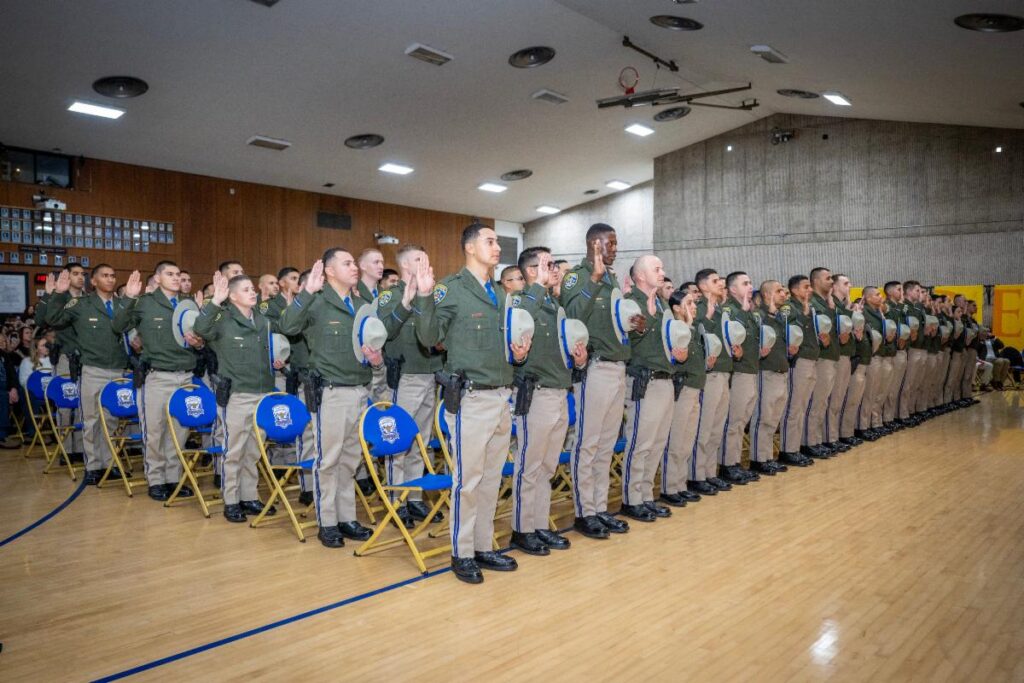
Before family and loved ones, the 137 cadets took their oath and received their badges, officially joining one of the nation’s largest law enforcement agencies during the CHP’s final 2025 graduation on Dec. 5, 2025. Photos: CHP
Department posts major gains in applications, reduced vacancies and hiring 780 cadets as year comes to a close
By Jaime Coffee Director of Communications, Office of Media Relations, California Highway Patrol
SACRAMENTO — As we near the end of 2025, Governor Gavin Newsom joined the California Highway Patrol (CHP) today in celebrating the Department’s final graduating class of the year. The 137 new officers who were sworn in during a ceremony at the CHP Academy on Dec. 5th will be placed throughout the state to protect and serve communities. This marks a significant achievement for the CHP, which graduated 780 cadets in 2025 alone. The CHP continues its efforts to recruit highly qualified individuals to protect the state’s community safety.
“I’m proud to see the young women and men stepping up to keep our communities safe. As we close out the year, California continues to make real progress — strengthening protections across the state while staying focused on the needs of the people we serve.” – Governor Gavin Newsom
“These cadets have been pushed to their limits and faced significant pressure, but despite all the hardships, they never gave up. Their determination to keep going, even when facing challenges, demonstrates their dedication to helping others and serving the people of California. The CHP proudly welcomes these new officers and looks forward to the remarkable achievements they will make throughout their decades of service.” – CHP Commissioner Sean Duryee
During their 26 weeks in the CHP Academy, cadets trained in vehicle code enforcement, crash and criminal investigations, emergency vehicle operations, and officer safety. The Academy’s curriculum also focuses on legal responsibilities, communication, ethics, and cultural awareness in order to prepare cadets to serve California’s diverse population. Earlier this week, the cadets took part in a 5-mile run as one of the last parts of their training. The new officers begin reporting to one of the CHP’s 102 Area offices across the state on December 15.
A Growing Force Protecting Californians
The CHP’s recruitment initiatives over the past few years — including the launch of the 2022 statewide “Join the CHP 1000” campaign and the “Cadets” web series — continue to drive strong interest in law enforcement careers.
Including today’s newly sworn members, the CHP has brought on more than 2,300 officers from January 2022 through December 2025.
From 2022 to 2024, applications increased by more than 52%.
The CHP is on track to receive more than 33,000 applications by the end of the year, continuing the upward trend.
- 2022: 16,077 applications
- 2023: 19,590 applications
- 2024: 25,477 applications
Join the CHP Today
Enhancing public safety remains a top priority for the Governor, and in November 2024, California successfully achieved its multi-year CHP recruitment goal of 1,000 new officers.
The CHP continues to actively recruit dedicated individuals who are ready to make a difference in communities throughout California. A career with the CHP offers comprehensive training, competitive benefits, and opportunities for professional growth and advancement.
To learn more about joining the CHP, please visit CHPMadeForMore.com to take the first step towards a rewarding career in law enforcement.
See video of the graduation on Dec. 5, 2025.
The mission of the CHP is to provide the highest level of Safety, Service, and Security.
Read MoreIncludes major regions such as the Bay Area, Stockton, Santa Rosa, Sacramento, Modesto, Madera, Fresno, Bakersfield, Ventura/Oxnard, Salinas, Los Angeles and San Diego
By Karla Fernandez, Public Relations, Market My Market
New Year’s Eve is consistently one of the deadliest nights of the year to be on the road. According to the National Highway Traffic Safety Administration, alcohol-impaired driving accounts for about 37% of traffic deaths during the New Year’s holiday period, with fatal crashes peaking during late-night hours between 9 p.m. and 3 a.m.
Nationwide, the National Safety Council projects more than 500 traffic fatalities during major holiday travel periods, and NHTSA reports that roughly one-third involve alcohol-impaired drivers – a risk that intensifies during overnight celebrations like New Year’s Eve.
To help reduce that risk, Setareh Law is offering free Uber rides (up to $20 each) across eligible California counties, giving people a safe way to get home on New Year’s Eve without getting behind the wheel.
This initiative is part of a broader community safety effort aimed at reducing impaired driving and helping more people get home safely during one of the busiest travel nights of the year.
Daniel Setareh, Founder of Setareh Law, explains, “New Year’s Eve is a time for celebration, not tragedy. After fighting for justice for families who have been forever impacted by impaired drivers, we want to do our part to help prevent these accidents before they happen. If one free ride will keep someone safe, then this effort is worth every bit of it.”
Here’s How It Works (Step by Step):
Step 1: Request Your Voucher
Fill out the short form on the official campaign page to request your Uber voucher. Once approved, you’ll receive a unique Uber voucher link by email.
Step 2: Add Your Voucher to the Uber App
Click the link in your email and the voucher will automatically load into your Uber app.
Step 3: Take Your Free Ride (Dec 31–Jan 1)
Use the voucher anytime between:
5:00 PM on December 31 through 10:00 AM on January 1
Your ride must start or end in one of the eligible California counties.
Eligibility Requirements:
To qualify for the free ride, users must:
- Be 21 years or older
- Have an active Uber account
- Take the ride during the campaign window (Dec 31–Jan 1)
- Start or end the ride in an eligible California county
- Limit: one voucher per Uber account
- Offer is limited to the first 300 vouchers
The voucher covers one one-way ride up to $20 (tip not included).
Eligible California Counties
Contra Costa, Alameda, San Francisco, San Mateo, Santa Clara, Sacramento, Fresno, San Joaquin, Stanislaus, Sonoma, Kern, Ventura, Monterey, and Madera, Los Angeles, Orange, Riverside, San Bernardino and San Diego.
Only rides that start or end in an eligible county will qualify. The Uber app will automatically prevent the voucher from applying outside approved areas.
About Setareh Law
Setareh Law, APLC, is a California-based personal injury law firm dedicated to representing individuals and families harmed by negligence. Founded by attorney Daniel Setareh, the firm handles serious injury cases including car accidents, drunk-driving crashes, catastrophic injuries, and wrongful death. With offices across California, Setareh Law is committed to providing hands-on legal representation, personalized client care, and strong advocacy both inside and outside the courtroom.
Read More
5,450 actions, 1,385 citations, 297 DUI arrests, 6 fatal crashes claim 8 lives during Christmas HEP
By Jaime Coffee, Director of Communications, Office of Media Relations, California Highway Patrol
SACRAMENTO — The California Highway Patrol (CHP) is ringing in 2026 by launching a New Year’s Holiday Enforcement Period (HEP). The CHP will boost patrols statewide from 6 p.m. Wednesday, December 31, to 11:59 p.m. Thursday, January 1.
While New Year’s is a time for celebration, the CHP encourages drivers to follow traffic laws, slow down, and always drive sober. Officers are prepared to stop reckless and impaired driving, which is one of the top preventable causes of crashes. During last year’s New Year’s HEP, the CHP reported 10 fatal crashes and 481 arrests statewide for driving under the influence. As you take the roads this week and celebrate the New Year, we want to remind everyone to make safety part of the plan: drive sober, slow down, stay focused & buckle up. Happy New Year from the California Highway Patrol!
“We’re entering a new year, but our message stays the same. Driving under the influence increases the risks on our roads, raises the chance of a crash, and puts lives in danger. We encourage everyone to do their part in keeping our roads safe by making responsible choices behind the wheel.” – Commissioner Sean Duryee
Driving while under the influence, whether from alcohol, drugs, or both, impairs judgment, decreases visibility and slows reaction times—key skills needed to drive safely. Before counting down to the new year, the CHP reminds everyone to plan ahead: designate a sober driver, use a ride-share service or public transportation and report drunk drivers by calling 9-1-1. Let’s start the new year safely.
Christmas HEP Results
During the 2025 Christmas Holiday Enforcement Period, which ran from 6 p.m. Wednesday, December 24, through 11:59 p.m. on Thursday, December 25, CHP officers took 5,450 enforcement actions, issued 2,744 citations, and made 297 DUI arrests statewide. Speeding remains a concern: 1,385 citations, including 94 over 100 mph. 6 fatal crashes claimed eight lives. Slow down, buckle up, drive sober.
The mission of the CHP is to provide the highest level of Safety, Service, and Security.
Read More
Front view aerial rendering by Tucker Sadler of the proposed Martinez Waterfront and Marina Plan presented to the city council on July 16, 2025. Source: City of Martinez
Private developer proposes vision, model, master plan for collaboration
By Eve Kearney, City Manager’s Office, City of Martinez
Martinez, CA — At their December 17, 2025, Regular meeting, the Martinez City Council unanimously approved an Exclusive Negotiating Agreement (ENA) with Tucker Sadler Architects, marking an important milestone toward revitalization of the Martinez Waterfront and Marina. The agreement sets in motion a new phase of study and collaborative planning that will evaluate the project’s feasibility, refine design concepts, and lay the groundwork for decisions on the future of the Waterfront and Marina.
Revitalizing the Waterfront and Marina has been a top community priority for decades. With aging infrastructure, deteriorating facilities, limited resources, and a marina well beyond its useful life, the City has faced growing operational and financial pressures that necessitate a broader reimagining through a private-public partnership.
Tucker Sandler, a San Diego-based architectural planning, design and development firm, has decades of experience delivering private and public sector development projects in California and in other states, including waterfront projects.
Now, with the ENA approval, the City and Tucker Sadler begin a formal 24-month period to collaboratively refine a transformative vision for the waterfront, conduct environmental review, engage the community, and negotiate a potential Development Agreement.
“Tonight’s approval is an important step for unlocking the potential of our Waterfront and Marina. We are excited to refine the project vision in the coming months with input from our community,” said Mayor Brianne Zorn. “This partnership gives us a path to activate our Waterfront, rebuild the Marina, and create a regional landmark that reflects Martinez’s identity, without placing the financial burden on our residents.”
A Vision for a Reimagined Waterfront
In July 2025, Tucker Sadler presented a conceptual vision for a comprehensive revitalization of the Waterfront and Marina. After extensive public comment and Council discussion, the Council directed staff to pursue an ENA to further explore the opportunity. (See City staff report and PowerPoint presentation)
Pursuant to the ENA, the City will work exclusively with Tucker Sadler to develop a comprehensive plan to create a vibrant, accessible, sustainable, and community-serving waterfront. The project is envisioned to include a broad range of landside and waterside improvements reflecting the Martinez identity and including thoughtfully-scaled commercial elements necessary to support and sustain the long-term financial viability of the project.
During this next phase, the City and Tucker Sadler will engage the community to garner input on the project’s features and undertake detailed analyses, technical studies, and design evaluations to determine how best to bring these concepts from vision to buildable reality.
On the landside, the project envisions new recreation amenities such as sport fields, a dog park, kite area, and public art installations, along with expanded open spaces featuring plazas, pedestrian pathways, marshland restoration, and stronger connections to downtown. Hospitality and community facilities, including hotels, restaurants, a community/event center, a new Martinez Yacht Club and Sea Scouts’ facility, and an outdoor amphitheater, are also included. These project elements would complement new commercial and retail spaces and support boating, fishing, recreation, and other waterfront activities, and would be supported by upgraded infrastructure, including surface and underground parking, utilities, and lighting.
On the waterside, the plan calls for a full reconstruction of the Marina with new and upgraded boat slips, fueling stations, and improved access for both motorized and nonmotorized vessels. It also includes repairing or redesigning the aging northern breakwater and eastern seawall, as well as adding new public amenities such as launch points for nonmotorized watercraft, accessible promenades, viewing decks, open spaces along the waterfront, and an area reserved for potential future ferry service.

Rendering of the proposed Boardwalk design for the Martinez Waterfront and Marina. Source: City of Martinez
A Financially Sustainable Path Forward
The ENA also establishes that the proposed project must be privately financed and self-sustaining, with no City subsidy and no financial risk to Martinez taxpayers. Tucker Sadler will reimburse the City for all staff, legal, and consultant costs during the negotiation period.
If a future Development Agreement is approved, the project could:
- Eliminate the City’s ongoing General Fund subsidy for Marina operations (savings of about $650,000+ per year)
- Shift responsibility for Marina reconstruction, including dredging and seawall/breakwater replacement, to the developer
- Generate new long-term revenue for the City through transient occupancy tax, sales tax, possessory interest tax, and lease payments
“This is a once-in-a-generation opportunity to secure the future of our Waterfront and Marina,” said City Manager Michael Chandler. “The ENA allows us to fully evaluate a revitalization effort that could eliminate ongoing subsidies, strengthen the City’s long-term fiscal health, and deliver an enhanced public asset the community can benefit from and enjoy for decades to come.”
Next Steps: Community Engagement and Environmental Review
Under the ENA, the City and Tucker Sadler, will manage and participate in a robust public engagement process that invites residents, businesses, waterfront users, and regional partners to provide input into the final vision. There will be multiple opportunities for community feedback as the project is designed and undergoes extensive studies and review processes.
The first round of outreach will begin in early 2026 as part of the City’s Sesquicentennial Community Sessions. These early conversations will help provide insight into the project process and initial concepts; dates and times of these sessions will be released later in 2025.
The City will also maintain ongoing information and feedback opportunities on its website at www.cityofmartinez.org/MarinaProject, ensuring the community can stay informed and participate at every stage.
Following the community engagement efforts, the project vision will be finalized and the formal environmental review processes required under the California Environmental Quality Act (CEQA) will commence. This analysis will evaluate potential environmental impacts, explore project alternatives, and ensure the planning process is grounded in transparency, data, and regulatory compliance.
“We’re grateful for the opportunity to move forward in partnership with the City and the community,” said Greg Mueller, Design Principal and CEO of Tucker Sadler Architects. “The ENA allows us to work collaboratively on a waterfront vision that honors the area’s history while creating new opportunities for the future.”

Rendering of the proposed Amphitheatre design for the Martinez Waterfront and Marina. Source: City of Martinez
History of the Martinez Marina
Constructed in the 1960s, the Marina has exceeded its useful life, with facilities closing due to safety concerns and environmental factors, such as sea level rise causing frequent flooding. Viewed as a unique and valuable community asset, the City Council has expressed a commitment to take measures to ensure it is safe and create a vibrant place for recreation and commerce benefiting residents and visitors alike.
The City assumed direct management of the Marina in August 2024 after the previous operator’s contract ended, revealing the need for a comprehensive rebuild rather than costly repairs. Maintaining the Marina has been a financial challenge for the City, which has been subsidizing the Marina for years, a scenario that is no longer sustainable. The Marina threatens to become a financial drain on the City’s general fund if a different course of action is not pursued.
“Our City’s Marina is a vital community asset that has faced decades of infrastructure deterioration and increasing financial strain on the City,” said Mayor Brianne Zorn. “An investment in Martinez by a private developer may offer a transformational opportunity to fund a comprehensive plan for our Marina and Waterfront.”
Additional background and the full scope of the ENA are detailed in the Staff Report included with the December 17, 2025 Regular City Council Meeting agenda. The complete ENA document is also available for public review as part of the meeting materials.
Resources:
Project Webpage – http://www.cityofmartinez.org/MarinaProject
Staff Report –
https://www.cityofmartinez.org/home/showdocument?id=5410&t=639016149231794854
Council Resolution –
https://www.cityofmartinez.org/home/showdocument?id=5414&t=639016460677029956
Exclusive Negotiating Agreement –https://www.cityofmartinez.org/home/showdocument?id=5412&t=639016149625840171
Read MoreBy Dawn Kruger, Community and Media Relations Coordinator, Contra Costa County Clerk-Recorder-Elections Department
Candidates can now collect signatures from registered voters in lieu of filing fees for the June 2, 2026 Primary Election. This part of the candidate filing process, known as Signatures-In-Lieu, began Friday, December 19th, and runs through February 4th.
State and County Candidates for Voter-Nominated offices may obtain forms from the Contra Costa County Elections Office at 555 Escobar Street in Martinez for circulating petitions to secure Signatures-In-Lieu of all or part of the filing fee. Signatures may also be applied to the nomination signature requirements for the office. This is an optional filing process to assist candidates who wish to collect signatures to offset the filing fee to run for office in the June 2, 2026 Primary Election.
For further information on this Primary Election and key dates, go to www.contracostavote.gov
“Our office is ready for the start of the 2026 Primary Election Process which begins with the Signatures-in-Lieu period,” said Kristin B. Connelly, Contra Costa Clerk-Recorder and Registrar of Voters. “We want to be sure that interested candidates in Contra Costa County are made aware of important dates as they prepare to run. This is especially important in light of recent redistricting changes for the United States House of Representatives because of the passage of Proposition 50.”
The nomination period for the June 2nd election opens February 9, 2026.
If you would like to speak to someone regarding candidate filling, please contact the Elections Office at (925) 335-7800 or via email at candidate.services@vote.cccounty.us.
Read MoreBy Jaime Coffee, CHP Director of Communications, Office of Media Relations
SACRAMENTO — The California Highway Patrol (CHP) is committed to keeping the public informed so they can make the safest choices for themselves and their families. As part of this effort, the CHP is highlighting new public safety laws passed during this year’s legislative session and signed by Governor Gavin Newsom. Unless otherwise noted, these laws take effect January 1, 2026.
CRIMES
Crimes: Burglary Tools (AB 486, Lackey)
Assembly Bill 486 makes it a misdemeanor to possess a key programming device, a key duplicating device, or a signal extender with the intent to commit burglary. The offense can result in up to six months in county jail, a fine of up to $1,000, or both.
This bill expands existing law by adding those three tools to the list of tools illegal to possess with the intent to commit burglary.
ELECTRIC BICYCLE SAFETY
Electric Bicycles: Required Equipment (AB 544, Davies)
Assembly Bill 544 mandates that electric bicycles must have a red reflector or a solid or flashing red light with a built-in reflector on the rear during all hours of operation, not just during darkness as the law previously required.
The bill also allows the CHP-developed online electric bicycle safety and training program to fulfill the safety course requirement for minors who receive a helmet violation involving electric bicycles.
Off-highway Electric Motorcycles (SB 586, Jones)
Senate Bill 586 defines an “off-highway electric motorcycle” or “eMoto” as a vehicle that:
- Is designed primarily for off-highway use
- Is powered by an electric motor that does not require a motor number
- Has handlebars for steering, a manufacturer-provided straddle seat, and two wheels
- Is not equipped with manufacturer-provided pedals
This bill also classifies an off-highway electric motorcycle as an off-highway motor vehicle (OHV), subject to the same rules and regulations. This includes a requirement that a person operating an OHV wear a safety helmet and that every OHV not registered under the Vehicle Code display an identification plate or device issued by the Department of Motor Vehicles.
PEDESTRIAN SAFETY
Pedestrian Safety: School Zones: Speed Limits (AB 382, Berman)
Assembly Bill 382 allows local authorities to lower the school zone speed limit from 25 to 20 miles per hour by ordinance or resolution through January 1, 2031. After this date, the speed limit will automatically decrease from 25 to 20 miles per hour in school zones when proper signage is posted.
SPEED ENFORCEMENT
State Highway Work Zone Speed Safety Program (AB 289, Haney)
Assembly Bill 289 authorizes the Department of Transportation to establish a work zone speed safety system pilot program. The program will utilize a fixed or mobile radar or laser systems to detect speeding violations and capture a clear photograph of a vehicle’s license plate. Citations will be issued to the vehicle’s registered owner with specified requirements and procedures for program implementation, citation issuance, review, and appeal.
Vehicles: Highway Safety (AB 390, Wilson)
Assembly Bill 390 expands the “slow down and move over” law to include any highway maintenance vehicle or stationary vehicle using flashing hazard lights or warning devices such as cones and road flares. Drivers approaching such a vehicle must move into a lane that is not next to the stopped vehicle or slow down to a safe speed if changing lanes is not possible.
Traffic Safety: Speed Limits (AB 1014, Rogers)
Assembly Bill 1014 authorizes the Department of Transportation to reduce a speed limit by five miles per hour on a highway, and mandates warning citations during the initial 30 days after a speed limit is lowered.
VEHICLE STORAGE
Vehicle Removal (AB 875, Muratsuchi)
Assembly Bill 875 authorizes a peace officer to impound a vehicle for at least 48 hours if the vehicle has fewer than four wheels but does not meet the definition of an electric bicycle, is powered by an electric motor capable of exclusively propelling the vehicle over 20 MPH on a highway and the operator is not licensed to operate the vehicle or is a class 3 electric bicycle being operated by a person under 16. A safety course may be required as a condition of release if the impoundment involves a child under 16 years old operating a class 3 electric bike as described in Section 312.5 of the Vehicle Code.
2024 LEGISLATIVE SESSION
The following public safety laws were passed during the 2024 legislative session and will go into effect in 2026.
Electric Bicycles, Powered Mobility Devices and Storage Batteries (SB 1271, Min)
Beginning January 1, 2026, Senate Bill 1271 focuses on improving the safety standards for electric bicycles, powered mobility devices, and related lithium-ion batteries. It requires these devices and their components, such as batteries and charging systems, to be tested by accredited laboratories to meet specific safety standards. The bill also mandates labeling these products to show compliance with safety regulations, ensuring consumers are informed. Furthermore, it prohibits distributing, selling, or leasing e-bikes and related equipment unless they meet these standards, aiming to reduce risks like fire hazards and electrical malfunctions. Beginning January 1, 2028, the bill would prohibit a person from renting or offering for rental an electric bicycle, powered mobility device, charging system, or storage battery unless it has been tested to the specified safety standard.
Autonomous Vehicles (AB 1777, Ting)
Upon the Department of Motor Vehicles (DMV) adoption of necessary regulations, AB 1777 creates new authority for a law enforcement officer to issue a “notice of autonomous vehicle (AV) noncompliance” to an AV manufacturer for an alleged traffic violation committed by one of their vehicles. Beginning July 1, 2026, AB 1777 establishes additional requirements for how AVs that operate without a human operator in the vehicle interact with first responders, including a requirement for manufacturers to provide a two-way device in the vehicles to communicate with first responders.
The mission of the CHP is to provide the highest level of Safety, Service, and Security.
Read More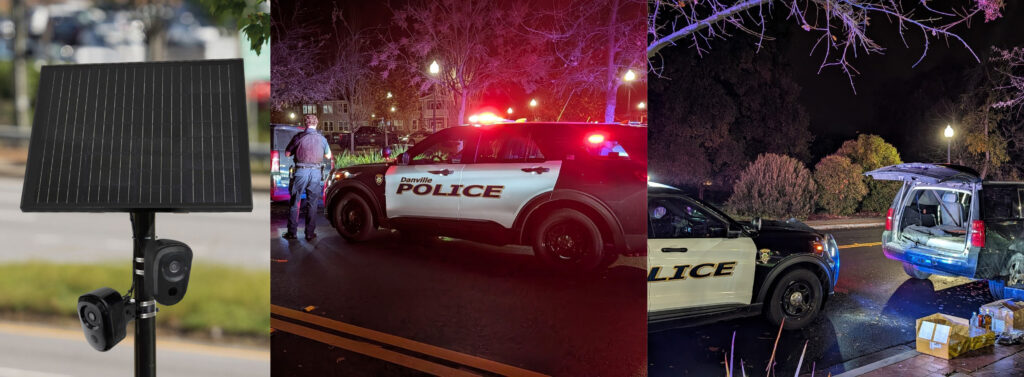
Flock Safety camera technology helped police stop a license plate thief Dec. 20, 2025. Photos: (Left) Flock Safety; (Center & Right) Danville PD
Great Police Work!
By Danville Police Department
On Saturday, December 20, 2025, a Danville resident reported their license plate stolen from their vehicle. Using Flock Safety license plate reader technology, our officers quickly located the stolen plate on another vehicle near I-680 and Diablo Road.
Officers conducted a traffic stop and detained the driver, who was also found in possession of stolen merchandise from a neighboring city.
Excellent work by our officers and a reminder that technology and teamwork help keep our community safe!
Read MoreHistoric class-action victory permanently blocks gender secrecy, restores parental rights
“…the federal court found, no such right can constitutionally override the fundamental rights of parents or the protections afforded to teachers under the U.S. Constitution…School boards and administrators must revise their policies immediately to comply…” – California Family Council
By Thomas More Society
San Diego, CA- In a landmark class-action ruling, Thomas More Society achieved a historic victory in Mirabelli, et al. v. Olson, et al., ending California’s gender secrecy policies and restoring transparency and parental involvement in public education. The decision and federal court order issuing a class-wide permanent injunction—issued by U.S. District Court Judge Roger T. Benitez just days before Christmas—secures justice not only for teachers Elizabeth Mirabelli and Lori West who began the lawsuit, but for all parents and teachers harmed by these policies statewide.
Elizabeth and Lori, faithful Christians with decades of teaching experience, loved their jobs and dedicated themselves to helping children thrive in the classroom. Under California’s Parental Exclusion Policies, children had an unqualified right to engage in a social transition to the opposite gender at school—forcing all teachers to use opposite-sex pronouns and a new name—and teachers were required to conceal that gender transition from the child’s parents absent the child’s affirmative consent.
This placed Elizabeth and Lori in an impossible position: lie to parents in violation of their faith and ethics, or risk retaliation and ultimately, their jobs. Believing it violated their sacred duty to protect students’ health, safety, and trust, they turned to Thomas More Society and filed suit. Now, the U.S. District Court for the Southern District of California has agreed, noting that “California’s education policymakers may be experts on primary and secondary education but they would not receive top grades as students of Constitutional Law.”
“Today’s incredible victory finally, and permanently, ends California’s dangerous and unconstitutional regime of gender secrecy policies in schools,” said Paul M. Jonna, Special Counsel at Thomas More Society and Partner at LiMandri & Jonna LLP. “The Court’s comprehensive ruling—granting summary judgment on all claims—protects all California parents, students, and teachers, and it restores sanity and common sense. With this decisive ruling from Judge Benitez, all state and local school officials that mandate gender secrecy policies should cease all enforcement or face severe legal consequences.”
“Elizabeth, Lori, and the parents who stepped forward as class representatives to fight for families everywhere are true heroes,” Jonna added. “Whether facing professional retaliation or protecting their own children, they never wavered in their commitment to faith, family, and the truth. They challenged a system that forced deception and put children at risk. Thanks to their courage, truth and justice prevailed and these unconstitutional policies can now finally be placed in the dustbin of history.”
“We are profoundly grateful for today’s ruling,” said Elizabeth Mirabelli and Lori West in a joint statement. “This has been a long and difficult journey, and we are humbled by the support we’ve received along the way. We want to extend our deepest thanks to Thomas More Society and to everyone who stood by us, prayed for us, and encouraged us from the very beginning.”
“We loved our jobs, our students, and the school communities we served,” Mirabelli and West continued. “But we were forced into an impossible position when school officials demanded that we lie to parents—violating not only our faith, but also the trust that must exist between teachers and families. No educator should ever be placed in that situation. This victory is not just ours. It is a win for honesty, transparency, and the fundamental rights of teachers and parents. We are so thankful that this chapter is finally closed and that justice has prevailed.”
“The State knew this was a losing legal battle and tried to pull out every lawyer’s trick in the book to avoid responsibility,” added Jeffrey M. Trissell, Special Counsel at Thomas More Society and attorney at LiMandri & Jonna LLP. “The Court saw right through this blatant gamesmanship. It’s an absurdity that California elected officials went out of their way to deceive parents and punish honest and faithful educators who dared to challenge their twisted political agenda.”
As the case progressed, numerous parents who had been directly harmed by these policies approached Thomas More Society. One family who joined the lawsuit only learned that their child was being addressed by a different name at school after a tragic suicide attempt. Recognizing the sweeping nature of the constitutional violations, the Court certified the lawsuit as a class action, meaning that every California parent and teacher who objects to these policies now receives justice.
“This case exposed a troubling pattern of agenda-driven adults injecting political ideology into schools, undermining trust between educators and parents, and ultimately harming children,” said Peter Breen, Executive Vice President and Head of Litigation at Thomas More Society. “Most reasonable people agree: schools should be about teaching the basics—reading, writing, arithmetic—not confusing students about gender identity. This ruling restores focus to real education and honoring the centuries-long belief that parents alone have the right to direct their child’s moral and religious upbringing, as reaffirmed by the Supreme Court this year.”
The case also revealed the extreme lengths California education officials went to evade responsibility. They misled the court by claiming these policies were no longer enforced, only to be caught red-handed enforcing them in mandatory teacher training a week before the summary judgment hearing on November 17. As a result, the Court’s order specifically directs California to add the following statement “in a prominent place” in that training:
“Parents and guardians have a federal constitutional right to be informed if their public school student child expresses gender incongruence. Teachers and school staff have a federal constitutional right to accurately inform the parent or guardian of their student when the student expresses gender incongruence. These federal constitutional rights are superior to any state or local laws, state or local regulations, or state or local policies to the contrary.”
“Thomas More Society is proud to have represented Elizabeth, Lori, and the anonymous plaintiffs: Teacher Jane Roe, Teacher Jane Boe, the Poe Family and the Doe Family,” said Breen. “They never sought to be the face of this fight, yet their courage has transformed the lives of families and educators not only in California but perhaps the entire country. We will always defend the religious freedom of teachers and families and ensure that parents retain their constitutional right to raise their children in alignment with their families’ values.”
California Family Council Applauds Ruling
In response to the ruling, the California Family Council (CFC) wrote: State Officials Promoted Secrecy – For years, California Attorney General Rob Bonta and other state leaders have insisted that schools must conceal information about a student’s gender identity or expression from their parents. On the Attorney General’s own website, the state asserts a sweeping individual “right” to conceal gender identity, including from parents:
“You have the right to disclose – or not disclose – your gender identity on your own terms, regardless of your age. Your school, whether public or private, doesn’t have the right to ‘out’ you as LGBTQ+ to anyone without your permission, including your parents.” California DOJ
This statement was widely disseminated and used to justify secrecy policies and trainings across districts.
Yet, as the federal court found, no such right can constitutionally override the fundamental rights of parents or the protections afforded to teachers under the U.S. Constitution.
Greg Burt, CFC Vice President, hailed the ruling as justice finally upheld in the face of longstanding statewide resistance: “This ruling vindicates what parents’ rights advocates have been saying all along. The state told schools they had to keep secrets from moms and dads, and that was never true. A federal judge has now made it unmistakably clear: children do not belong to the government, parents have the right to know what’s happening with their own kids, and teachers should never be forced to lie or stay silent to keep their jobs.”
The Constitutional Holding
Judge Benitez’s ruling is comprehensive and unequivocal. The court held that California’s gender-secrecy regime, as applied in public schools, violates:
- Parents’ fundamental rights to direct the upbringing and education of their children
- Teachers’ First Amendment rights to free speech and religious exercise
- And core constitutional principles protecting family autonomy
According to the court, forcing teachers to actively hide critical information from parents is not a neutral policy but affirmative state interference in the parent-child relationship, something the Constitution forbids.
Impact on Schools and Parents
This decision forces a dramatic policy shift across California’s public education system:
- District secrecy policies can no longer be enforced.
- Parents and guardians have a federal constitutional right to be informed if their public school student child expresses gender incongruence.
- Teachers may now freely disclose to parents when a student expresses gender incongruence or assumes a different gender identity at school.
- State officials can no longer legally claim that schools are “required” to conceal such information.
School boards and administrators must revise their policies immediately to comply with the constitutional rights affirmed by the court or risk legal consequences.
Read the Order Granting Plaintiffs Motion for Class-Wide Permanent Injunction.
About Thomas More Society
According to the organization’s website, “Since 1998, Thomas More Society has steadfastly preserved the rich heritage of American liberty. Our distinguished track record showcases an unwavering commitment to defending your fundamental rights to life, family, and freedom. For decades, we’ve passionately championed the causes of everyday individuals confronting remarkable injustices, from the sidewalks and town squares to the Supreme Court.” For more information visit www.thomasmoresociety.org.
Allen D. Payton contributed to this report.
Read More








